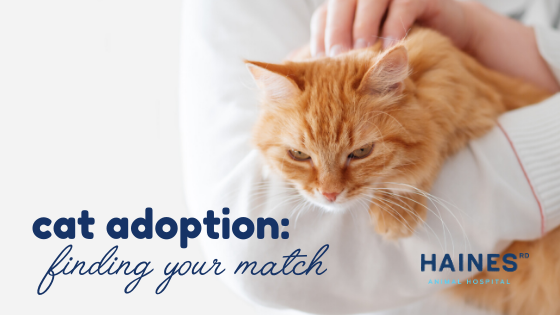Cat Adoption: Finding Your Match

The ASPCA estimates there are approximately 6.5 million pets in shelters across the country. Many of these animals are great pets, but their families gave them up for a variety of reasons, including death or illness of a caregiver. Because there are so many worthy animals waiting for their furever homes, it makes sense to adopt. However, when it comes to bringing another family member into your home, there are a few considerations to keep in mind. After all, this is a big commitment and you want to make the best decision for everyone involved, rather than falling blindly for the first cute face you see.
Choose a Personality
While you interact with all the adoptable cats, you’ll notice that some cats meow for special attention, while others simply lie back and gaze at you with a bit of apprehension. Just like humans, every cat has a unique personality and first impressions can be hard to discern. Don’t hesitate to ask the shelter staff and volunteers about the cats they spend so much time with – they know all about which cats like to snuggle and sleep all day, or which would rather chase everything in sight. You need to consider which personality might be best for you and your lifestyle.
It may be very tempting to adopt a cute little kitten, but if you have a very laid-back, frail, or elderly cat at home, it is best to avoid kittens and/or very playful, rowdy cats. And vice versa. If you have a lively cat who is constantly bouncing off the walls of your house, getting a very calm or quiet, shy cat is probably not a good idea.
Age and sex might be the biggest factors to consider, outside of general personality: “In an ideal new cat/old cat matchup, the newcomer would be a younger and smaller cat that is fixed and of the opposite gender.” This can help you avoid conflict due to competitive instincts.
Kitten or Cat?
Kittens are curious, playful, and full of energy; adult cats are more relaxed and less mischievous. Kittens need more time to train and feed, and keep in mind that cats are only kittens for a few months. Young children usually don’t have the maturity to handle kittens properly, so a cat that’s at least four months old is probably the best choice for homes with children, 6 years or younger.
Shorthair or Longhair?
Cats may be expert groomers, but some need a little more help from their humans than others. Fluffy cats with long coats can matte without frequent brushing, and some cats arent always the easiest to brush so that may require some extra skill and patience. Consider the amount of time you have to invest in your new feline’s coat.
- Shorthaired cats are more abundant at the shelter because they’re the most common type.
- The main thing to keep in mind is that long-haired cats require frequent grooming. Cats with short coats also benefit from brushing – though they do not need it as frequently.
- Most cats enjoy a regular brushing and will look forward to this as part of a daily routine with you.
Room for One More
If you already own a cat or dog, you’re probably wondering if it’s easy to add a new cat to the family. The good news is that cats can get along with other cats and—despite the common stereotype—most dogs can get along with cats too. The key to introducing a new cat to a home with other pets is patience—yours not the cat’s.
The best way to add a new cat to your home is to understand that there’s a period of adjustment for all involved. You can ease the transition by isolating your new cat in a room of his own for a while—a good idea for any new cat.
After several days, bring your pets together for brief periods of time and supervise their interactions. As your pets become more familiar with each other, increase the length of these visits. Most cats will soon learn to accept each other, and some become the best of friends.
Most dogs will also adjust to a new cat, and by carefully introducing them, most problems can be successfully managed.
Be a Hero
Many rescue pets, especially the older ones, have immense gratitude to you for providing them a loving home. They’ll look at you with adoration every day, and they tend to be extremely devoted.
